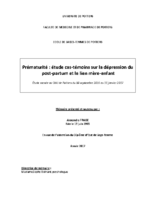Mémoire
Fraise Alexandra
Prématurité : étude cas-témoins sur la dépression du post-partum et le lien mère-enfant : étude menée au CHU de Poitiers du 10 septembre 2016 au 31 janvier 2017
FrançaisConsulter le texte intégral (format PDF)

Résumé
Français
Prématurité : étude cas-témoins sur la dépression du post-partum et le lien mère-enfant : étude menée au CHU de Poitiers du 10 septembre 2016 au 31 janvier 2017
Introduction : La dépression postnatale est un problème de santé publique, elle concerne environ 10 à 20 % des femmes mais elle est souvent sous diagnostiquée. Une naissance prématurée constitue-t-elle un facteur de risque de développer cette pathologie ainsi que des troubles du lien mère-enfant ?
Matériel et méthode : Dans cette étude cas-témoins prospective monocentrique menée au CHU de Poitiers, 76 femmes ont été analysées, 38 ayant accouché prématurément chacune appariée à une femme ayant accouché à terme. Deux auto-questionnaires, l’Edimbourg postnatal depression scale (EPDS) et le Mother Infant Bonding questionnaire (MIB) leurs ont été distribués trois jours après l’accouchement. Un seuil supérieur à 11 pour l’EPDS et un seuil supérieur à 2 pour le MIB ont été retenus pour dépister respectivement un risque de dépression postnatale ou un trouble du lien mère-enfant.
Résultats : Cette étude a montré qu’il y a un risque significativement plus important de développer une dépression du post-partum p = 0,02 (OR = 0,26 ; IC à 95 % [0,07 ; 0,84]) et de présenter des troubles du lien mère-enfant p = 0,01 (OR = 0,12 ; IC à 95 % [0,01 ; 0,62]) lors d’un accouchement prématuré. Il n’existait pas de corrélation significative entre les résultats du MIB et de l’EPDS (p = 0,26), le degré de corrélation était égal à 0.2.
Conclusion : Les femmes ayant accouché prématurément ont présenté un risque de développer une dépression postnatale et des difficultés du lien mère-enfant plus important que celles qui ont accouché à terme. Il serait donc intéressant de compléter ce travail en évaluant leurs états psychologiques et la relation mère-enfant quelques mois après la date théorique du terme.
Mots-clés libres : dépression post-partum, relation mère-enfant, prématurité.
- Accouchement prématuré
- Dépression du post-partum
English
Introduction: Postnatal depression is a public health problem which concerns approximately 10-20 % of women but is often little diagnosed. Does this post-partum pathology increase in the cases of premature birth? Does premature birth increase the risk of developing this pathology as well as difficulty in mother-infant bonding?
Patients and methods: A case-controlled, monocentric, prospective study was carried out in Poitiers Teaching Hospital. 76 women were studied, 38 having had preterm births each matched to a woman having had a term birth. Two questionnaires, the Edinburgh Postnatal Depression Scale (EPDS) and the Mother Infant Bonding (MIB) were distributed to them three days after the birth. Upper thresholds of 11 for the EPDS questionnaire and 2 for the MIB questionnaire were retained in order to detect respectively a risk of postnatal depression or difficulty in mother-infant bonding.
Results: This study showed that there was a significantly more important risk of developing post-partum depression p = 0.02 (OR = 0.26; IC in 95 % [0.07; 0.84]) and difficulty in mother-infant bonding p = 0.01 (OR = 0.12; IC in 95 % [0.01; 0.62]) after a premature delivery. There was no significant correlation between the results of the MIB and the EPDS questionnaires (p = 0.26), the degree of correlation was 0.2.
Conclusion: A preterm birth presented risks for developing postnatal depression and mother-infant bonding disorders greater than term births. It would be interesting to complete this study by analysing the mothers’ psychological state and mother-infant bonding a few months after the birth.
Keywords : postpartum depression, mother-infant bonding, prematurity.
Notice
- Diplôme :
- Diplôme état sage femme 5ème année
- Établissement de soutenance :
- Université de Poitiers
- UFR, institut ou école :
- UFR Médecine et Pharmacie
- Domaine de recherche :
- Maïeutique
- Directeur(s) du travail :
- Sophy Boinard
- Date de soutenance :
- 30 juin 2017
Menu :
-
-
à propos d'UPétille
-
Voir aussi
Annexe :

-
Une question ?
Avec le service Ubib.fr, posez votre question par chat à un bibliothécaire dans la fenêtre ci-dessous ou par messagerie électronique 7j/7 - 24h/24h, une réponse vous sera adressée sous 48h.
Accédez au formulaire...
Université de Poitiers - 15, rue de l'Hôtel Dieu - 86034 POITIERS Cedex - France - Tél : (33) (0)5 49 45 30 00 - Fax : (33) (0)5 49 45 30 50
petille@support.univ-poitiers.fr -
Crédits et mentions légales
